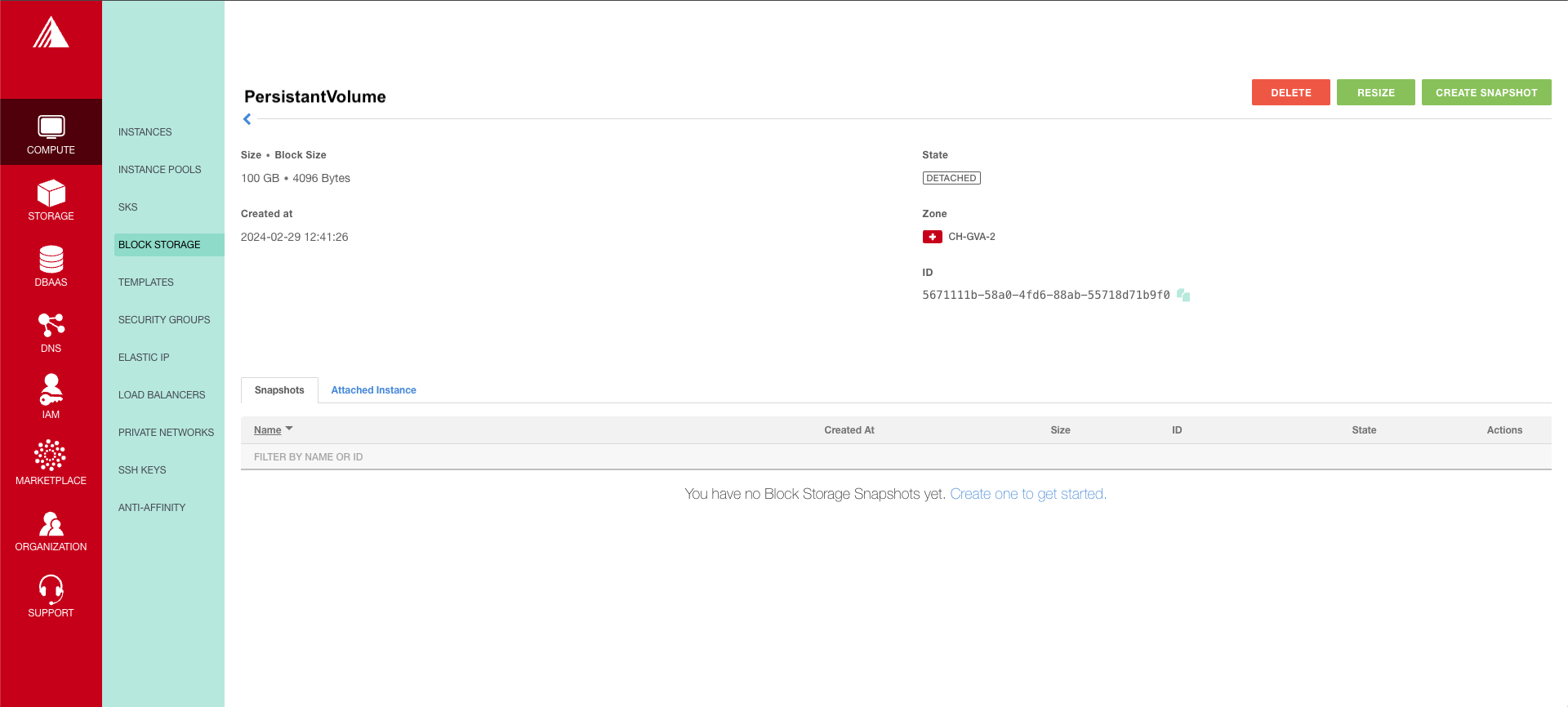
High data durability
Multiple copies of data stored at all times on distinct servers. Unlimited snapshots retention.

Multiple copies of data stored at all times on distinct servers. Unlimited snapshots retention.

Benefit from high performance for your latency sensitive applications like databases. All backed by latest generation NVMe SSDs.

Easily add volumes to your instances to always meet your growing capacity needs.
Based on it’s unique characteristics, block storage is the choice for mission-critical and I/O intensive applications. It can be used for relational or transactional databases, time series databases, containers or hypervisor file systems. Because Volumes are directly connected to an instance, their I/O speeds are much faster than those of an alternative storage solution like Object Storage.
With being equally flexible, scalable, and efficient, block storage is the perfect match to containerized applications on the cloud. Containers benefit from the speed of block storage and the native ability for a single host to mount multiple blocks. Seamlessly migrate between servers, locations, and operating systems.
Our block storage comes at a fairly priced cost to performance ratio. The simple pricing structures ensures predictability of upcoming costs. No IOPS provisioning or per usage variability.
| Product Details | Price ({{ currency | uppercase }}) | |
|---|---|---|
| Volume | per GiB.hour | {{ prices['blockstorage']['volume'][currency] | number:8 }} |
| Volume Snapshot | per GiB.hour | {{ prices['blockstorage']['snapshot'][currency] | number:8 }} |
Retain data over longer periods. Create persistent volumes for storing critical data, databases, or other important information that need to be stored and accessed across multiple instances or sessions.


Benefit from 5,000 IOPS per volume. For Read AND write operations, no sharing.

Use block storage together with compute instances, or Managed Kubernetes.

Each volume can be snapshot via an API operation. A snapshot can be used as a base to fork another volume from it.

Adapt your storage needs by attaching up to 5 Block Storage volumes to an instance with a maximum of 10 TiB for each volume.

Create a Block Storage volume in seconds using our portal, CLI, API, or Terraform provider. Move blocks from one Instance to another by detaching and then reattaching your volumes.

Easily interact with Block Storage via Kubernetes by using our Exoscale CSI Driver. Read more

Your data is replicated at minimum two times on multiple nodes to guarantee availability, even in case of a disk failure.

As a true European Cloud Provider all data is stored in the country of your chosen zone, fully GDPR compliant.
…other Exoscale products. Easily compatible with SKS, Object Storage or Compute.

High-performance KVM powered virtual machines for any workload. Select from our pre-defined instance sizes to configure your cloud server's CPU cores and memory.
Discover
Deploy a production ready cluster in 120 seconds. Manage it with a simple web portal, CLI, API or your choice of tools like Terraform.
Discover
An S3 Compatible Object Storage to store your assets, files, and metadata at a competitive price.
DiscoverLocal storage on Exoscale Compute instance is already a block storage device. The main difference between the 2 types of devices is that the local storage cannot be easily detached and reattached to another compute instance. Other attributes differ as well, mainly around the size flexibility where Local Storage is bound to minimum and maximum limits associated to the instance type versus Block Storage that can be used up to 10 TiB per volume.
Object Storage is an unlimited and unstructured storage service that is accessed over an HTTP REST API and can be directly used by applications or even client side web browser. With Object Storage only the effective size of objects within a bucket are charged on a per GB basis. On the other hand, Block Storage is a low level storage service that is designed to mount Volumes at the operating system level. Each volume has a fixed capacity when attached to a Compute Instance. Applications or databases backend that need to store data to a volume need to rely on file system primitives offered by the operating system.
Block Storage volumes are charged per GiB.hour for the full provisioned capacity of the Volume. They are accounted whether the volume is attached or not to an instance and the resolution goes down to the second.
Block Storage Volumes can be resized throughout their lifetime to an upper value in one operation. The scale volume function is available via the API, CLI or Portal. The file system hosted on the volume requires an expansion after volume size increase.
When running mission critical production workloads in the cloud, a partner you can rely on makes all the difference. Our customer success engineers have helped hundreds of customers from all over Europe migrate, run and scale production workloads on Exoscale.
Contact us